 3
Issue 3
3
Issue 3
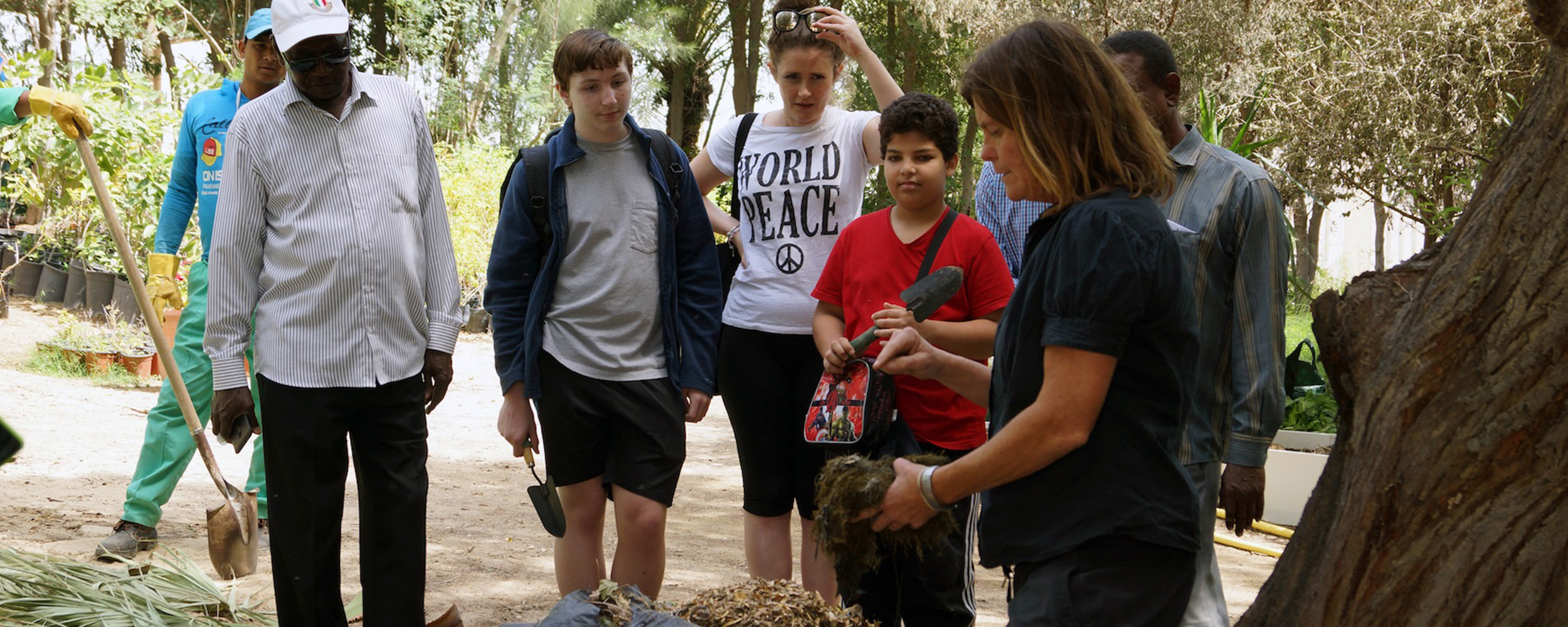
Nance Klehm teaching at the Permaculture Workshop Soul to Soil: From Waste to Fertility, Building Soil Fertility with Compost, Qatar University Plant Nursery, 19 March 2016. © Qatar University.
Permaculture and Edible Landscape for Food Security and Biodiversity at Qatar University
The edible permaculture garden at Qatar University is a significant emerging landscape project initiated by Department of Architecture faculty member Dr. Anna Grichting. Designed by her Undergraduate students, and supported by a grant from the Qatar Foundation, the garden project has benefitted greatly from the participation of Luzita Ball and Paige Tantillo, two certified permaculturists collaborating with the Department.
Landscape is an emerging field and discipline that contributes to increasing the quality of life and improving urban ecosystems. It stands at the centre of today’s political, aesthetic, social and ecological discourses. With the emergence of new sustainability imperatives and the remerging of disciplines in a more holistic approach, landscape is no longer considered as merely a decoration that beautifies a building or a city, but as a vital infrastructure (hence the term, ‘landscape infrastructure’) that contributes to improving the health, vitality, and liveability of urban systems. It also contributes to improving resource efficiency, increasing food security and enhancing biodiversity.
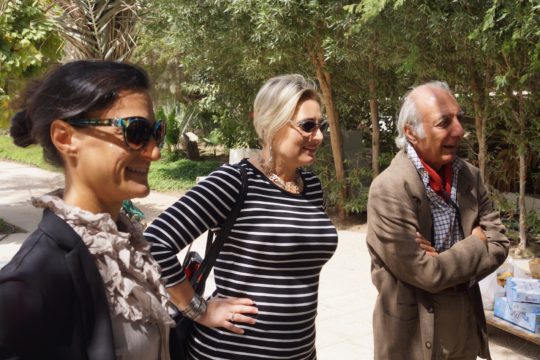
Permaculture designer Paige Tantillo, landscape architect Katrin Schulz-Barth and architect Marcello Terzano at he Permaculture Workshop Soul to Soil: From Waste to Fertility, Building Soil Fertility with Compost led by Nance Klehm, Qatar University Plant Nursery, 19 March 2016. © Qatar University.
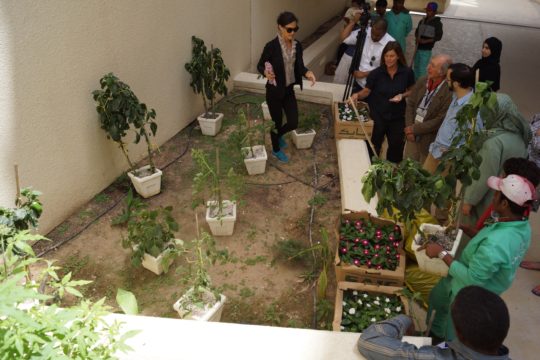
Nance Klehm teaching at the Permaculture Workshop Soul to Soil: From Waste to Fertility, Building Soil Fertility with Compost, Qatar University, 19 March 2016. © Qatar University.
Permaculture can help to create landscapes that minimise resource use (water, energy, soil); increases recycling (organic waste, water); creates healthier produce, without pesticides and fertilisers, while at the same time promoting biodiversity of fauna and flora. Edible landscapes can contribute to the food security of the Qatar University campus and of Qatar, and also reduce the carbon footprint, food miles or distances that food travels to our plate.
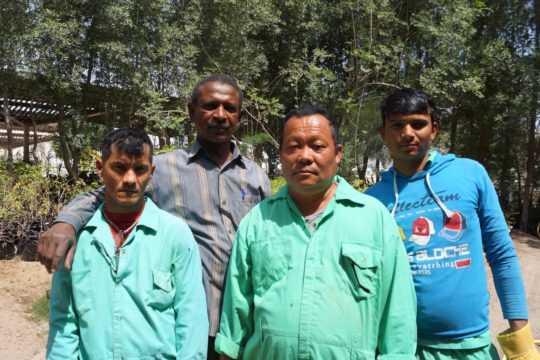
Gardeners and landscape engineers from Qatar University participating in the Permaculture Workshop Soul to Soil: From Waste to Fertility, Building Soil Fertility with Compost, Qatar University Plant Nursery, 19 March 2016, led by Nance Klehm. © Qatar University.
The permaculture garden project is envisioned as an interdisciplinary project that will involve different departments and research centers at Qatar University, and will contribute to the vision of creating an ‘edible campus’ there based on urban permaculture principles. It brings together academics and practitioners, and also involves the campus facilities engineers and gardeners, the expatriate workers and students at Qatar University, looking at ecological, social and economic values of integrated and holistic landscape practices and systems. The Qatar University Edible Campus project is a key focus of UNI, UN-Habitat’s partnership with universities worldwide, analysed on its website.
Dr. Anna Grichting
Dr. Anna Grichting is an architect, urbanist and musician from Switzerland and graduated with a Doctor of Design in Urbanism from Harvard University. She has lived, practiced and studied in England, Ireland, Switzerland, the USA and the Gulf region, and conducted research in Cyprus, Korea, Berlin and Qatar. She is interested in holistic and systems approaches to design and her academic experience includes teaching at the Universities of Geneva and Harvard, developing an Education Initiative for the Aga Khan Award for Architecture and teaching the Balkans Peace Parks Academic Expedition Summer Course.
Dr. Grichting is currently Assistant Professor in the Department of Architecture and Urban Planning at Qatar University, teaching courses in Sustainable Architecture, Urban and Landscape Design, and Architectural Design Projects. Her fields of research and interest include Blue Design and Coastal Urbanism; Food Security and Food Urbanism in Drylands; Urban Biodiversity, Urban Forestry and Urban Wetlands; the Urban Legacies of Mega Events; Healing Ecologies in Border Landscapes, Cultural and Memorial Landscapes and Ecotourism of Conflict; and Public Art in Contemporary Urban Realm. As a musician, she has performed in the US, Switzerland, Pakistan, and Qatar, and has just released a CD with Desert Bridges in Qatar.
www.annagrichting.com
http://www.qu.edu.qa/engineering/architecture/faculty/anna.php
anna.grichting@qu.edu.qa, anna.grichting@post.harvard.edu
Twitter: @AnnaGrichting
Nance Klehm
Nance Klehm is a process-oriented ecologist with proven experience in restructuring existing situations into more functional systems with a strong social dynamic. She is the Founder and Director of Social Ecologies, which creates durational projects that aim to build healthy habitat and interaction through direct engagement of place with those who dwell there. Social Ecologies seeks to encourage holistic, systematic thinking through varying levels and degrees of project participation. Projects such as The Ground Rules, for example, are typically birthed and supported for several years for substantial research, learning and dialogue to develop and for ideas to emerge and become embodied in continued action.
Nance Klehm and her work have been reported on in over 60 national and international media outlets including radio, print and 17 books. She has formally exhibited her work internationally in galleries and museums. She was named a 2012 Utne Visionary and has twice been a finalist for the Curry Stone Design Prize. She is currently at work on a book on soil.
www.socialecologies.net
nettlesting@yahoo.com/info@social ecologies.net
Twitter: @NanceKlehm
Luzita Ball
Luzita Ball graduated in 1992 with a BSc in Agroforestry from the University College of North Wales, Bangor, in Wales. She completed the theoretical part of a course in Permaculture Design in 1993, and in 1998 was awarded an MA in Urban Regeneration from the University of Westminster, London. In October 2016 she started a Higher Degree and Doctorate programme in Environmental Sciences at the University of Northampton, UK, researching the role of permaculture in urban sustainability. She is currently on an eco-committee coordinating an ecogarden at a local primary school as well as helping to move forward the Qatar University Permaculture Garden, both projects intended as tools for education, through demonstration, interaction and research.
Last year she worked as a Graduate Teaching Assistant at the Department of Architecture and Urban Planning, Qatar University, while completing one year of the PhD in Urban Planning programme. She has over the last 20 years in the UK and Qatar, written and published various articles and other educational materials on the Environment and Islam; given lectures and interactive workshops related to environmental management, permaculture and the use of medicinal plants; and produced and presented a series of radio programmes on topics related to Science, Environment and Islam.
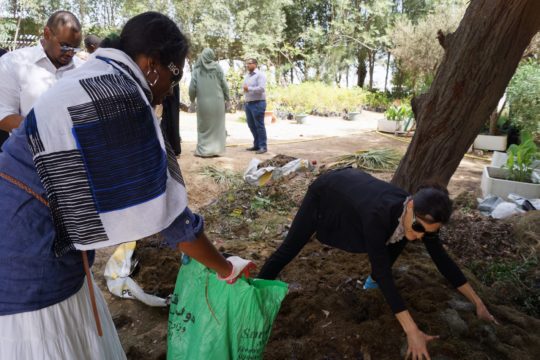
Permaculture designer Paige Tantillo takes part in the Permaculture Workshop Soul to Soil: From Waste to Fertility, Building Soil Fertility with Compost, Qatar University Plant Nursery, 19 March 2016, led by Nance Klehm. © Qatar University.
Paige Tantillo
Paige Tantillo is a certified permaculture designer, master gardener and artist with a Bachelor of Arts degree in Spanish Translation and Business. A native of Chicago, Paige currently resides in Doha, Qatar. Since receiving her permaculture certification in Jordan in September 2011, Paige has applied the permaculture techniques she learned to the challenging growing conditions locally. Using a combination of her new knowledge and skills gained earlier, she developed a permaculture test garden, which included grey water recycling, composting, and chickens to provide a food resource.
Paige believes permaculture has enhanced her knowledge, allowing her to create fresh and unique garden designs. She constantly seeks ways to be more sustainable and to share that knowledge with others. Her goal is to inspire and educate youth and the community about the importance of sustainability and its connection to healthy living.
Her projects and initiatives in Qatar include the Edible Landscaping Project with Qatar University; Youth Environmental Awareness and Gardening Club; vegetable garden design for PassivHaus in Qatar; developing a curriculum for an educational garden programme, and designed and implemented programs for local schools; designing handson permaculture and organic workshops; presentations on permaculture, soil and composting; permaculture garden design for private residents and schools.
AJ+, 2015, video